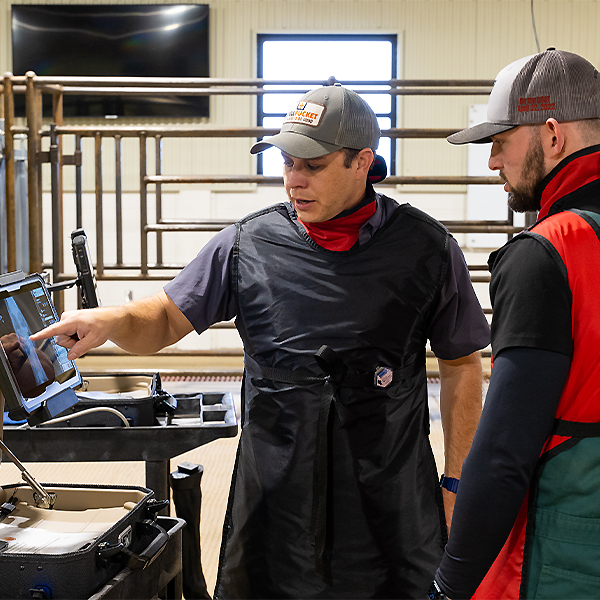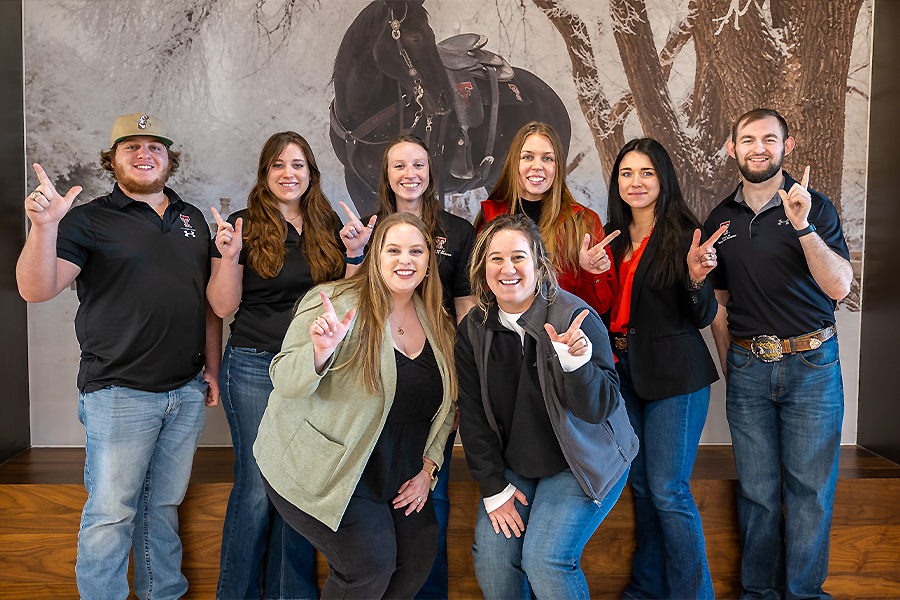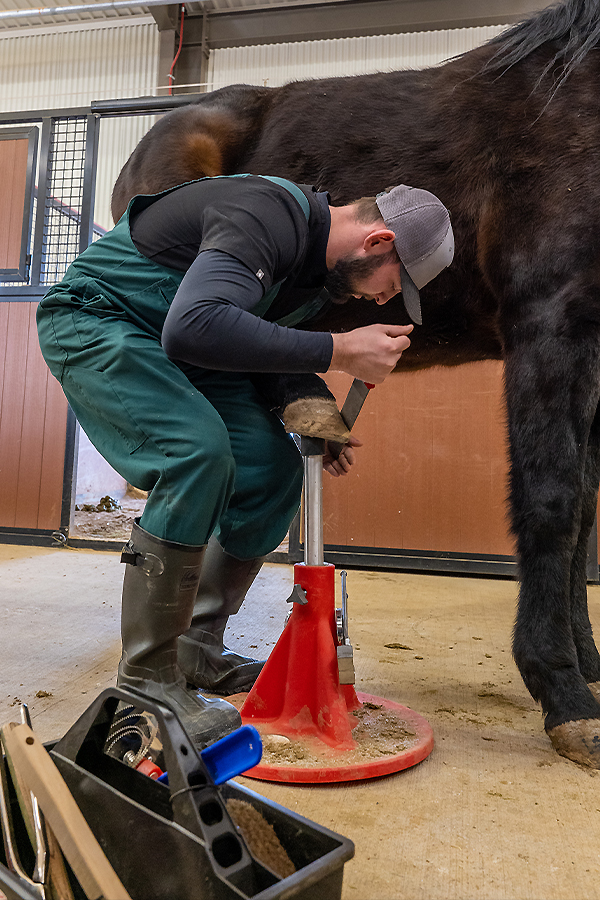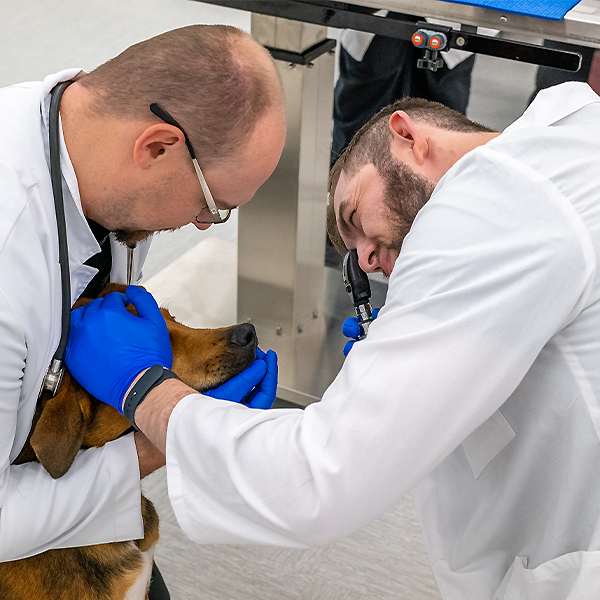
Conner Chambers has a passion to fulfill the veterinary service needs of rural and regional communities.
Conner Chambers was raised in the small town of Henrietta, Texas in Clay County. Henrietta has a population of about 3,100 people while 10,700 people call Clay County home. He graduated from Henrietta High School in 2017 in a class of 49 students. He represents the fourth generation of a cattle ranching family in Clay County.
During high school Chambers was heavily involved in 4-H, FFA, and football. He showed cattle at livestock shows across Texas, raising most of his own steers and heifers from birth. He was also involved in many other livestock-related projects in 4-H and FFA.
In the fall of 2018, Chambers began his undergraduate career at Texas Tech University where he majored in Animal Science. During his time at Texas Tech, he was heavily
involved in the Texas Tech Pre-Vet Society. He had the privilege of serving as treasurer,
vice president, and president in his four years of being a member of the Pre-Vet Society.
Chambers also had opportunities to study abroad in South Africa to perform research
with elephants and to shadow under a wildlife vet. He strongly believes his education
and experiences at Texas Tech helped prepare him for veterinary school.
Chambers is currently the treasurer for the Texas Tech University School of Veterinary Medicine Food Animal Club and is working with Dr. Philippa Gibbons to develop bovine models that can be used to for education. One of the activities he plans to be part of is the bovine palpation team when his class has enough palpation experience to form a team so they can compete against other veterinary schools. Let's get to know Conner Chambers through a series of questions.
How did you become interested in veterinary medicine?
The first time I was exposed to veterinary medicine was watching my local veterinarian, Dr. West, pregnancy check my family's herd of cows when I was 8 years old. While I was helping him, my first show heifer came through the chute to be checked for her first pregnancy. Dr. West allowed me to palpate her, which I thought it was so amazing. That was the moment that really stuck with me, and I considered being a veterinarian for my career. During high school, I shadowed under Dr. Harlan in the summers to confirm if this is what I wanted to do with my life. I learned quickly I enjoyed the chaotic days of a veterinarian, and how every day is different than the last. I also developed a passion for working with farmers and ranchers to help better their livestock operations, and I knew that being a veterinarian was for me.
How does your previous life experience coincide with the School of Veterinary Medicine's mission?
Henrietta, Texas has a population of 3,100 people and is the largest town in Clay County making it very rural. Henrietta is heavily dependent on agriculture just like many rural communities across Texas. Growing up in a ranching family, I developed a love for livestock. I showed cattle across Texas for ten years. I also competed in livestock judging, Beef Educational Presentations, and other 4-H and FFA competitions.
From high school and throughout my undergraduate education I would shadow under Dr. Harlan every summer. His veterinarian clinic is a mixed animal practice that has clients in region of six counties. While shadowing under him, I would go on farm calls to work on cattle and horses, observe numerous surgeries on many species, and learn about the general work life of a veterinarian. I plan to practice in similar veterinary practices as his. I want to be able to work with a diverse set of clients you see in rural and regional communities such as ranchers, running livestock operations that their livelihood depends on, to pet owners seeking care for their pets.
I learned early on from my parents just how important community and leadership is to making these small towns function. My mom serves on the school board and the county livestock board, and my dad is very active helping other kids with their livestock projects and buying calves at the county livestock show. These values were instilled in me. I have tried to be heavily involved in community service in Lubbock during my undergraduate education. I have worked with Habitat for Humanity, the local animal shelter, and an organization for special needs kids known as Night to Shine.
What led you to decide Texas Tech University School of Veterinary Medicine was the
place where you wanted to pursue your career in veterinary medicine?
The mission statement of the school really spoke to me. Even before I knew the school was opening, I wanted to be a veterinarian for agriculture communities in Texas. When I learned of the school's mission to train future veterinarians to work in rural and regional areas, I knew I would be a good candidate for the program. I also really loved how the school was making hands on experience a priority. Looking back a year and a half ago, I am very glad I made that decision. I am very much proud to call myself a Texas Tech School of Veterinary Medicine veterinary student.
What does it mean to you to be part of the inaugural class at the School of Veterinary Medicine?
Four years ago, I would never imagine I would be able to say I would be part of an inaugural School of Veterinary Medicine class, but I am extremely proud to be part of this class. Many of the veterinarians I have spoken to over the past year including Dr. Harlan have told me how impressed they are with my class and the school. The amount of support we have received from donors and veterinarians cheering us on has meant a lot to me. My class has high expectations to meet, but I am confident we will live up to them when we graduate in 2025.
How was your first-year experience at the School of Veterinary Medicine?
My first year was challenging to say the least. The amount of information I had to
consume and retain each day was much more than I expected coming into vet school.
Despite this, I greatly enjoyed my first year at the School of Veterinary Medicine.
The professors here are very supportive and care so much for our education and success.
Many of the professors have open door policies and go out of their way to make sure
that we understand the information.
I am also very appreciative of how much hands-on experience we received our first year. During our first year of clinical skills we have had multiple client interactions, learned how to perform physical exams on all species of animals, learn suture patterns, and work on improving our ultrasound skills. It is encouraging to know that School of Veterinary Medicine strongly values readying us to be practice ready veterinarians.
What are your career plans after graduating the School of Veterinary Medicine?
My immediate career plan is to become an associate veterinarian for a mixed animal clinic that has a strong focus on working with large animals. I have a strong passion for working with cattle and ranchers to better their operations. I would love to work for a clinic that shares the same passions and an experienced veterinarian to mentor me.
How are you going to help the School of Veterinary Medicine achieve its mission?
I plan to practice veterinary medicine in a rural or regional community here in Texas. These types of veterinarians are in short supply, and I want to be able to fill those rolls. I also want to be involved in the community I practice in. Like my parents, I want to be able to support my community whether it means serving on leadership boards, or just giving back through scholarships and purchasing livestock projects. I have had many people support me along my educational career, and I want to be able to do the same for other students when I am finally able to do so.
What advice would you pass along to an incoming student at the School of Veterinary Medicine?
The most important piece of advice I could give to an incoming student is to be more than just a veterinarian student. Veterinary school requires lots of time and dedication, however that does not mean you need to sacrifice everything else for your grades. Even though we do not have as much free time as we did in undergrad, I strongly believe it's important to make time to do things you love whether its exercising, hobbies, and spending time with friends and family.
